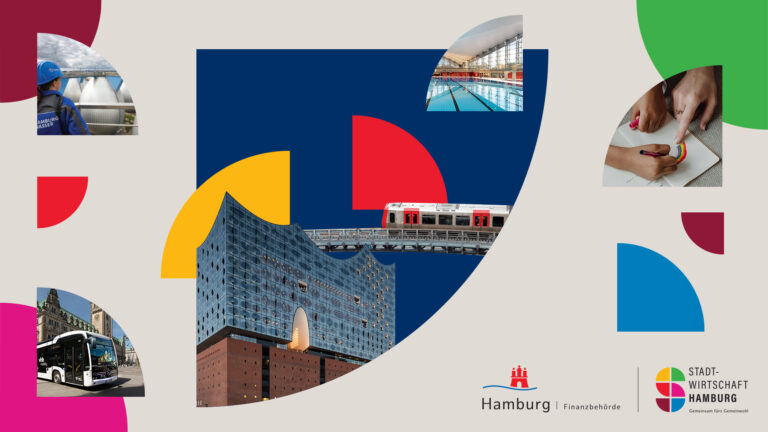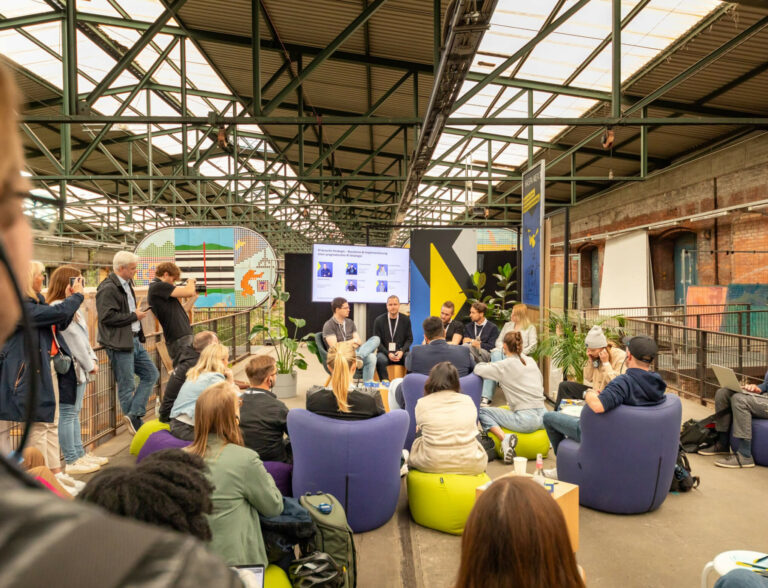Calls for Transfer funds 16 new ideas from Hamburg universities
The ninth call marked the end of the successful pilot phase of the “Calls for Transfer” (C4T) funding programme. Of the 63 project applications received from all of Hamburg’s public universities, 16 ideas were selected for funding towards the implementation phase. In line with the principles of the programme, the initial project phase should further the potential for transfer and innovation and the resulting impact for society. C4T is open to all disciplines at Hamburg’s public universities and supports creative solutions, innovative inventions or research projects with start-up potential with a maximum of €30,000. Due to the high quality of the many applications, it was decided at the final review meeting of the ninth call to allow 16 ideas to go forward to the next project phase instead of the ten originally planned.
Even though all 63 applications showed potential for innovations to be realised within just six months, the 16 approved projects stood out not only for their innovative approaches and the real chance of practical application, but also for the successful planning for implementation within six months. The responses to the ninth call, designed to support innovations in a “sprint process”, showed once again just how diverse the ideas in Hamburg’s research environment are. The spectrum of applications ranged from innovative medical approaches to the treatment and deeper understanding of diseases, to advances in sustainability in the fields of energy supply, building materials and IT, and to interdisciplinary approaches that offer new perspectives on robots and on science communication.
Making science visible through an innovative science illustration approach
Teaching quantum theory principles – such as the behaviour of matter and energy at the atomic and subatomic levels – can pose a challenge for teaching and communication. With the help of various science illustration tools, the “AMODI API for modular content” project, led by Professor Schulz-Schaeffer (HAW Hamburg), aims to make teaching content more comprehensible for physics lessons at upper secondary level and for physics students. This approach is to be researched as part of the C4T funding programme, for example using visual extensions of real experiments using mixed reality applications.
Interdisciplinary perspectives on robots
Can machines become a medium of interpersonal relationships? This is the research question posed by the “Future Affair – Remote touch” project led by Dr Abbasimoshaei (TUHH). As part of this artistic-scientific project, perspectives from art, science and technology interact in a discursive space within which a robotic system is being developed. The aim of this system is to be able to touch lovingly and thus enable people to give and receive affective touch across physical distances.
Which media sources can be trusted
Information and content shared on social media are at high risk of manipulation, especially in critical political situations. Verifying the authorship of content on mobile devices is therefore the aim of the “Mobile Trust” research project. Professor Skwarek’s team (HAW Hamburg) is developing an application based on blockchain generates a “non-repudiable” identity for a mobile phone. This identity can then be used by other applications to signify trustworthy data.
Sustainable building materials for earthquake-prone areas
Sharath Peethambaran Subadra, research associate in the Department of Mechanical Engineering and Production Management (HAW Hamburg), will be researching innovative building materials that are suitable for use in earthquake-prone areas as part of the project “Novel lightweight natural fibre concrete construction for the building industry”. The aim is to investigate the possible reduction in corrodibility and simultaneous increase in toughness that could be achieved by using locally available natural fibres in concrete structures. In addition to the safety aspects, the impact of the project also includes the cost-effectiveness of cheaper building materials and the sustainability of local renewable materials.
Innovative approach to the treatment of chronic inflammatory bowel diseases
Chronic inflammatory bowel diseases such as Crohn’s disease and ulcerative colitis are on the increase globally, and their treatment usually involves long-term medication. Aside from frequent side effects, the significant proportion of patients for whom the therapeutic agents do not work at all is a particular problem. In addition, the high incidence of the diseases and the associated treatment costs pose a growing challenge for the health system. The “MetaboColitis” project, led by Dr Adlung (UKE Hamburg) aims to overcome this challenge by identifying metabolites that could enable bowel inflammation to be alleviated. A second step is to use artificial intelligence to develop individualised, cost-effective treatment methods that could be used worldwide.
A list of the 16 projects receiving grants follows this snapshot illustrating the range of the funded projects:
„NuSANS – Nutzerfreundliche Sensorik für die Analyse von Schonhaltungen“, Professor Roman Kusche (HAW Hamburg)
„Affective Computing in Virtual Reality”, Professor Larissa Putzar (HAW Hamburg)
“AMODI API für modulare Inhalte”, Professor Reinhard Schulz-Schaeffer (HAW Hamburg)
„MobileTrust“, Professor Volker Skwarek (HAW Hamburg)
„Neuartige leichte Naturfaserbetonkonstruktion für die Bauindustrie“, Sharath Peethambaran Subadra (HAW Hamburg)
„Future Affair – Remote touch“, Dr.-Ing. Alireza Abbasimoshaei (TUHH)
„Entwicklung eines automatisierten Biofilmsprühprozesses – BioSpray“, Professor Johannes Gescher (TUHH)
„Smart Sensors Group Projektkoordination Institut für Integrierte Schaltungen (IIC) Projektumsetzung“, Professor Ulf Kulau, Professor Andreas Bahr, Patrick Kleinschnittger (TUHH)
“Data-driven Optimization of electric Bus Operations (D2eBus)”, Professor Eva Bittner, Marten Borchers (UHH)
“Follow-the-Sun-Computing: Green Computing on the Edge”, Professor Janick Edinger (UHH)
“Development of intercommunicative Body-on-a-Chip devices for research in the health sector to explore consultancy-customization startup model”, Dr Alessandra Picchiotti (UHH)
“KONSENDO – Digitales Einwilligungsmanagement für die Forschung“, Michael Wuppermann, Thom Drögemüller (UHH)
„Cloud-Anwendung für die optimale Verteilung von Landstromanlagen in Häfen“, Jingjing Yu (UHH)
„MetaboColitis – Stoffwechsel-basierte Behandlung entzündlicher Darmerkrankungen“, Dr. rer. Nat. Lorenz Adlung (UKE Hamburg)
„Weiterentwicklung eines Biomarkers im Blut zur Messung der Neurodegeneration in der Multiple Sklerose“, Professor Manuel Friese (UKE Hamburg)
Since 2018, Calls for Transfer has enjoyed ever-increasing popularity, reflected not only by the strong demand in the latest round, but also by the inexhaustible wealth of ideas from Hamburg’s researchers. Calls for Transfer clearly closes a gaping hole in the funding jungle and helps small ideas from science and research to grow so that they can ultimately become big solutions.
Accordingly, we hope to be able to offer a tenth call in the coming year because the challenges we face as a society on a daily basis are ever increasing. For this reason, we are more reliant than ever on those innovative project ideas that, without suitable funding, would not get off the ground.
And ideas like these need a programme like C4T, which invests in potential opportunities rather than established facts.
The “Calls for Transfer” funding programme is financed by the Hamburg Ministry of Science, Research, Equalities and Districts (BWFGB) and is managed by Hamburg University of Technology (TUHH).
More on C4T
You can find further information on the programme and answers to frequently asked questions here:
Contact
Contact person for Calls for Transfer
Mareike Post
Project Manager of the “Calls for Transfer” funding programme
Hamburg Innovation GmbH
Tel: +49 40 76629-3153
Email: post@hamburginnovation.de
C4T stories
RELA
TED

November 18: Open House at Hamburg Innovation
Hamburg Innovation opens its doors on November 18—compact, hands-on, project-centered. Discover our Hamburg Innovation projects in a poster exhibition, short walk & talk tours, mini-impulses, and expert discussions—staggered in time for maximum flexibility.

Hamburg Innovation Summit 2025
The Meeting Point for Future Innovators On July 10, 2025, Hamburg’s Oberhafenquartier will once again transform into a vibrant hotspot for innovation and forward-thinking ideas.

Strong partnership paves the way for worldwide application: research team at UHH cooperates with Siemens Healthineers on innovative imaging method
The medical imaging method developed with the aid of Calls for Transfer should now be destined for use in laboratories around the world. To date,

Follow-up funding secured: C4T project on deep fakes selected for BMBF “DATIpilot” funding programme
C4T provides framework for further developing research project on protecting authorship of information on social media Especially in critical political situations, information on social media
